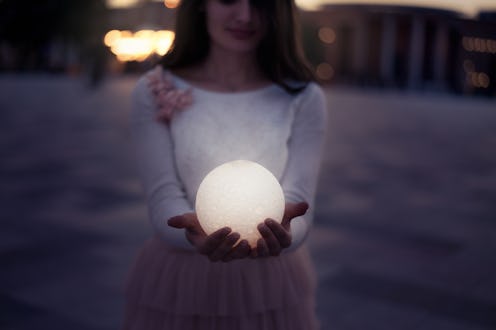
It's easy to see why we have so many myths and legends associated with the full moon. During this phase — which occurs once ever 29.5 days — the moon appears bigger and brighter. And with it comes an eery glow, that can make the night sky seem different, and even a little bit magical.
This plays a role in why humans have always been in awe of full moons — and the moon in general. "The moon is a symbol of harmony and wonder that people have always looked to for the regulation of their lives, not only the celebration of rites, but for the passage of the rhythms of life," Kac Young, PhD, author of Dancing with the Moon, tells Bustle.
In astrology, the full moon is viewed as a great time to set intentions for the month ahead, Carmen Mayes, astrologer and spiritual wellness coach, tells Bustle. Beliefs and traditions associated with this lunar phase have been around forever, and can feel quite powerful.
That said, science doesn't always agree with some of our long-held full moon beliefs. When it comes to things like increased birth rates, ovulation, and other things associated with full moons, many are currently considered more myth than fact. Here, some interesting beliefs we have about the moon, as well as what science has to say about them.
1It Affects Mood And Behavior
"Many, including mental health professionals, believe the full moon has a direct effect on mood and behavior," licensed psychotherapist Adamaris Mendoza, LPC, MA, tells Bustle. It is believed by some that it leads to people acting erratically.
"In ancient Greece and Rome, philosophers believed that the water in the brain was probably affected just like the ocean’s tide is," Mendoza says. "They then believed that whenever the moon was full it would trigger strange behaviors in humans."
While there isn't any solid scientific data to back up this belief, many mental health experts sustain that a full moon can make some people feel uneasy, Mendoza says, which might explain why they act a bit differently.
That's not to say, though, that the moon can cause dramatic behavioral changes. Science has yet to find a significant relationship between the full moon and human behavior.
2It Effects Ovulation
"Ovulation during the full moon is thought to be correlated with a fertile cycle," Dr. Jolene Brighten, author of Beyond the Pill, tells Bustle. "This is because ancestrally speaking, the full moon would have woken us and with predators outside, odds were you'd stay inside and find other activities to engage in."
Many people also believe that, since our bodies are made up of various fluids, a full moon might affects us just like it can the tides. But so far science has yet to back up this claim, and no direct impact on ovulation has been found.
3It Impacts Periods
Similarly, there's a longstanding belief that a full moon can impact the menstrual cycle, Dr. Brighten says. And while the jury is still out on how big of an impact it can have, there is some evidence to suggest a full moon can help regulate your period.
For example, a 2011 study published in the journal Acta Obstetricia et Gynecologica Scandinavica tracked the menstrual cycles of 826 women aged 16 to 25 years, according to Health.com. Almost 30 percent of women had their period around the full moon, compared to just 12.5 percent during a different phase of the moon.
And when you think about it, it kind of makes sense. "Women have a 28 menstrual cycle with phases of fertility just like the moon," Mayes says. "Typically, women bleed around either the new moon or the full moon."
4It Can Impact Your Sleep
Many people believe a full moon can make it more difficult to sleep. And that might actually be true, according to Psychology Today.
When the moon is full, the sun is illuminating its surface fully, so it appears much brighter than during other phases. And thanks to all that extra light, it can be more difficult to sleep.
Some animals have also been found to be more active during full moons, so it's not just humans who can feel the impact.
5It Can Impact Surgery
There's a belief that full moons can affect the outcome of surgeries. As Dr. Young says, "Best advice: Don’t have surgery at the full moon."
But is there any data to back it up? According to Health.com, researchers found that patients who had an emergency heart surgery called acute aortic dissection repair during a full moon didn't need to stay in the hospital as long, and were less likely to die, compared to patients who had the same surgery during different phases of the moon.
Of course, you can't predict certain health issues. And if you need a surgery, the moon shouldn't really come into play. But it is an interesting full moon fact, all the same.
6It Can Lead To Increased Births
There's a myth floating around that more babies are born during full moons. But, as it turns out, this lunar phase doesn't actually induce labor.
According to DukeHealth, a change in barometric pressure may due the trick, which is why a storm may help a laboring mother along. Full moons, though, not so much.
While there's lots of myth, legend, and belief surrounding full moons, not all of it is based in fact. Science may back a few things up, here and there. But for the most part, we should enjoy the full moon for all its beauty, and not expect it to change us too much.